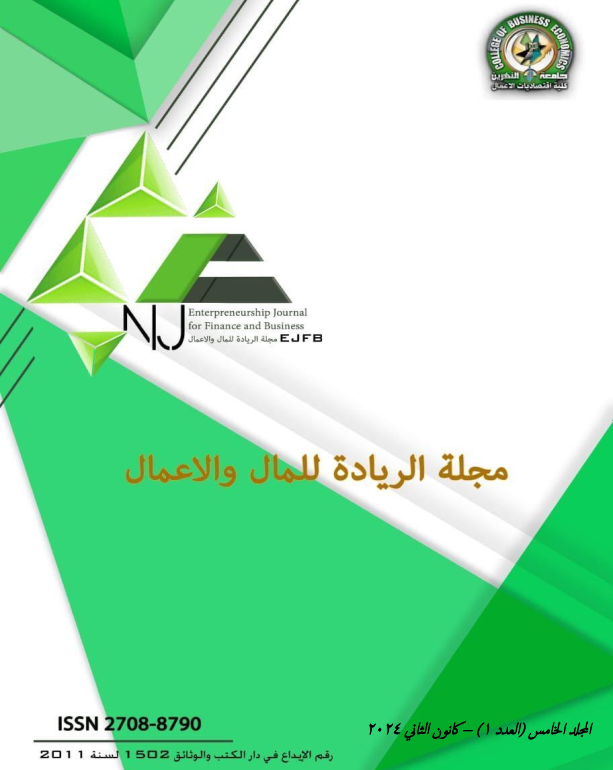التحول الرقمي والإدارة المستدامة في الجامعات العراقية
DOI:
https://doi.org/10.56967/ejfb2024404الكلمات المفتاحية:
التحول الرقمي، الإدارة المستدامةالملخص
أدركت الجامعات حول العالم بتحديات التحول الرقمي في ظل التطور التكنولوجي المتسارع والذي أصبح جزءاً لا يتجزأ من المنظومة التعليمية لكافة البرامج الأكاديمية وذلك للعديد من المزايا لصالح أطراف العملية التعليمية وانتهاء صلاحية الطرق والأساليب والأدوات التقليدية والمعروفة للجميع، مما دفعها إلى عقد اتفاقيات مع الشركات العالمية المتخصصة بالتكنولوجيا والبرمجيات والتقنيات والأدوات لتجهيز بُنيتها التحتية للعملية التعليمية لكافة البرامج الأكاديمية ومن مختلف الاختصاصات لبناء معارف ومهارات الطلبة وتهيئتهم لسوق العمل في ظل التحول الرقمي والمفروض على جميع القطاعات.
أن التحول الرقمي لم يعد خيارًا ، بل أصبح ضرورة لجميع المؤسسات التي تسعى إلى الارتقاء في كفاءة عملها، وضمان استمراريتها. إذ أن النمو المتسارع للتكنولوجيا الرقمية، والتطور في الأجهزة والأنظمة الذكية، وزيادة القدرة على معالجة البيانات والذكاء الاصطناعي، أسهمت في إحداث تغيرات ثورية، ما يتطلب من الجميع التعامل مع المجتمع الرقمي ودعمه وتطوره من خلال الاستثمار بالموارد البشرية والكفاءات التي تمتلك المهارات الرقمية والقدرات والشغف والطموح والحوار، مع التركيز على النظرة الشمولية في أساليب التعليم والتركيز على ما هو مطلوب في المستقبل.
وكما ذكرت آنفا ، إن التحول الرقمي أصبح ضرورة ملحة تسعى المؤسسات التعليمية إلى ترسيخه وتكريسه، ولم تعد تقنيات التعليم والمنصات الرقمية فكرة، بل ممارسة وضرورة للعملية التعليمية والتعلمية، وعلى الجامعات الاستفادة من التقنيات الرقمية بما يُحسّن ويجُوِّد من العمليات والممارسات التعليمية، بما يعزز تجارب المتعلم والأستاذ، ويدعم إنشاء نماذج تعليمية فعالة ذات أثر دائم، ذلك أن التحول الرقمي في الجامعات يساعدها لتعمل بشكل أكثر فعالية، ولتبقى قادرة على المنافسة في التصنيفات والاعتمادات العالمية، ولتنجح في إعداد المتعلم لبيئات العمل الرقمي.
في هذا السياق، تعد الرقمنة ضرورة في مؤسسات التعليم العالي، وحيث يمكنها جذب المزيد من الطلاب الأفضل، وتحسين تجربة الدورات والمواد التعليمية وعملية التدريب بشكل عام. كما تسمح بالمراقبة والمتابعة من أجل الكشف عن عقبات ومعيقات التدريب وتقليل خطر التسرب من مقاعد الدراسة. ومع ذلك، فإن التردد في فهم واستغلال الفرص للتحرك نحو هذه البيئة الرقمية لا يزال قائماً. كما ومن الضرورة أن يتم التحول الرقمي وفقًا لمسلمات التواصل، لتوحيد التزامها بتلبية توقعات مختلف المجموعات ذات الاهتمامات بالأبعاد الاقتصادية والاجتماعية والبيئية.
التنزيلات
منشور
كيفية الاقتباس
إصدار
القسم
الرخصة
الحقوق الفكرية (c) 2024 نغم حسين نعمة

هذا العمل مرخص بموجب Creative Commons Attribution 4.0 International License.
هذه هي مقالة منشورة بنمط الوصول الحر وموزعة تحت شروط ترخيص المشاع الابداعي نسب المصنف (CC BY) 4.0 دولي التي تسمح بالاستخدام غير المقيد، التوزيع، واعادة الانتاج في أي وسيط أو صيغة، والتحوير أو البناء على المادة، بما في ذلك للأغراض التجارية، شريطة أن يتم نسب العمل للمؤلف الأصلي.










